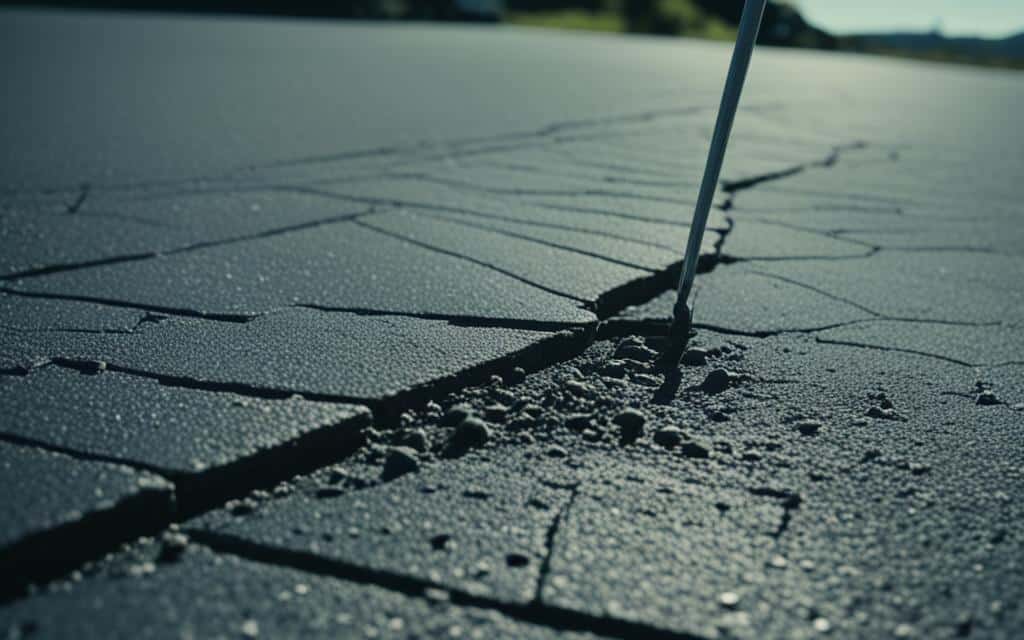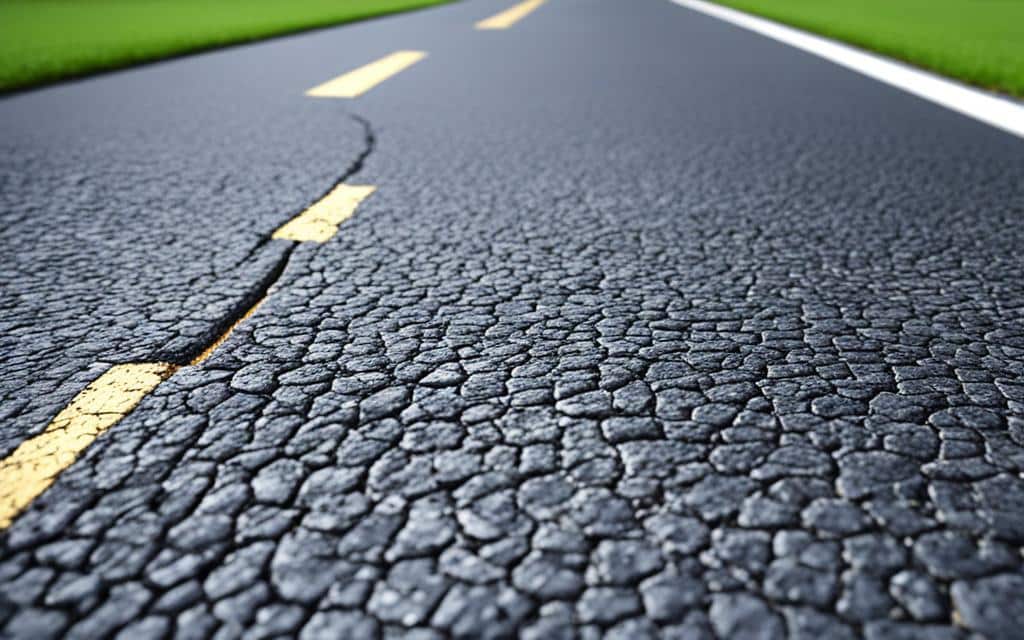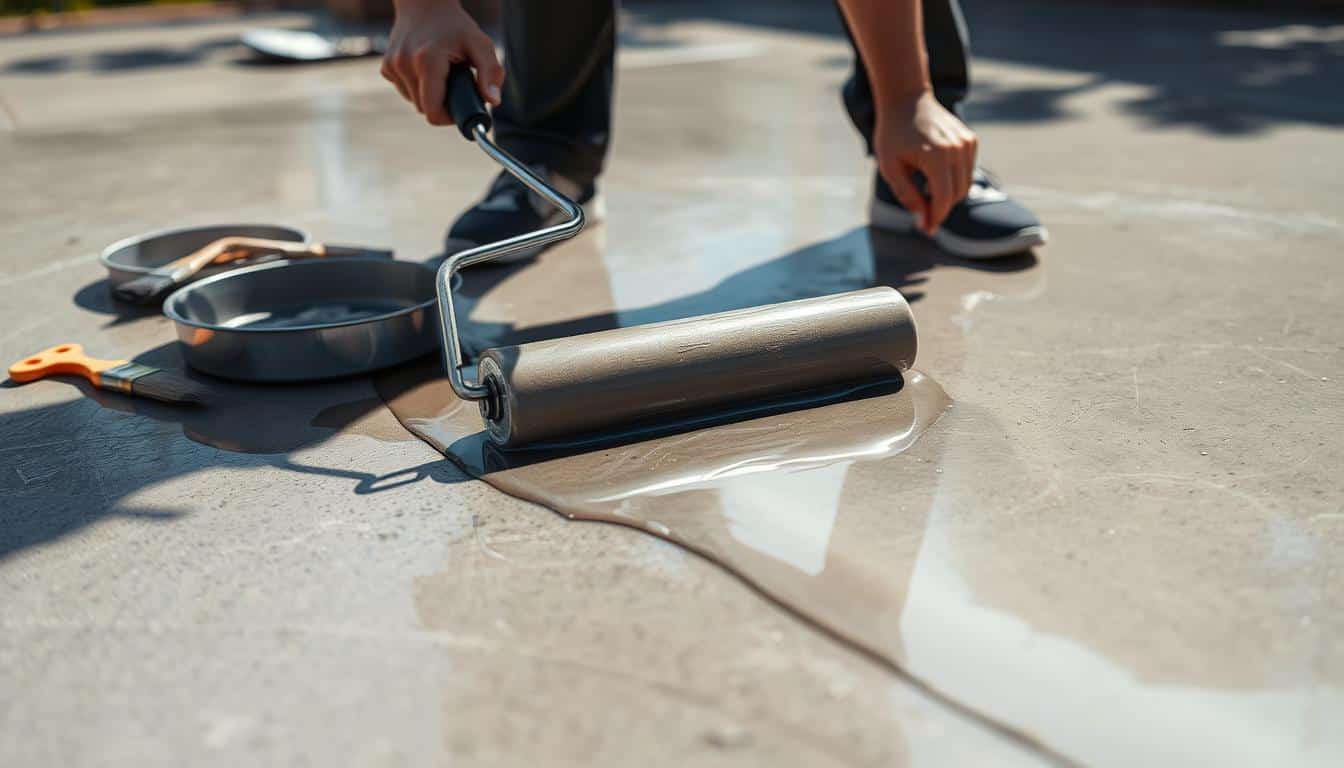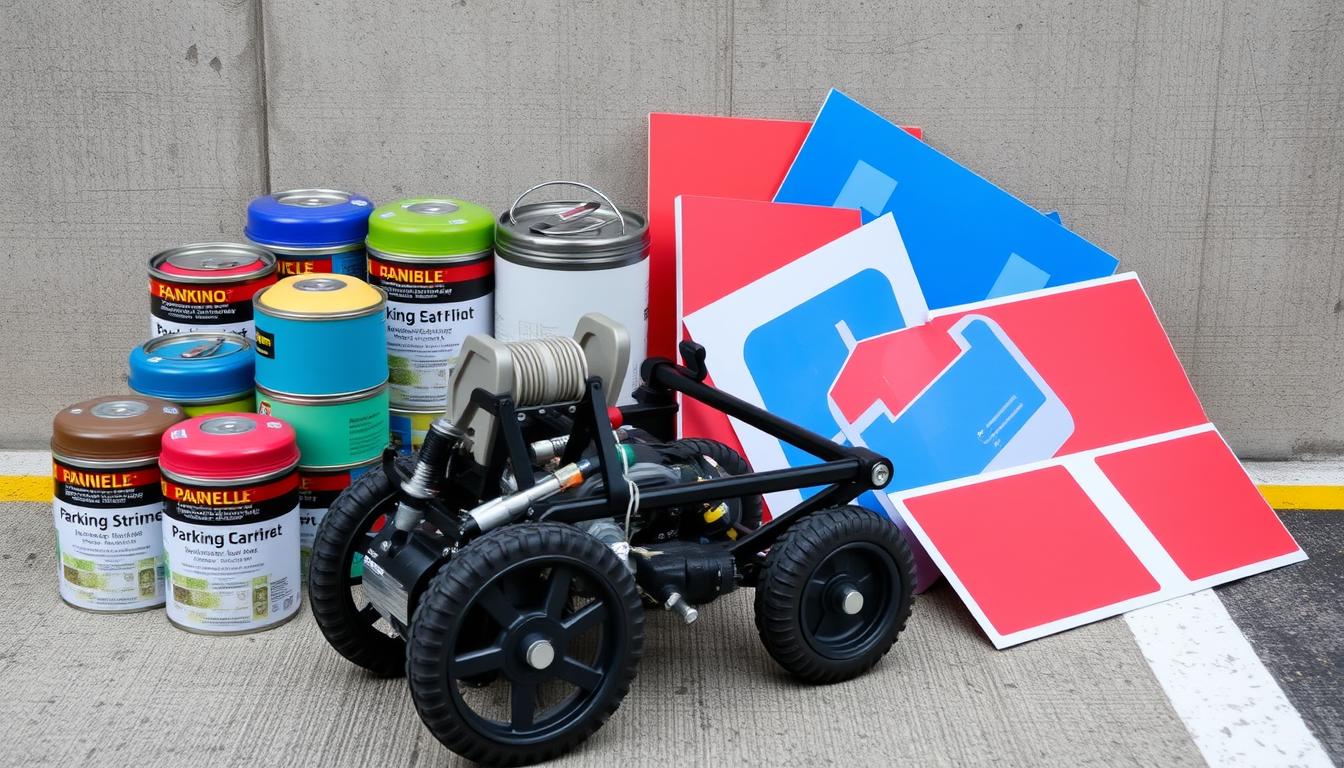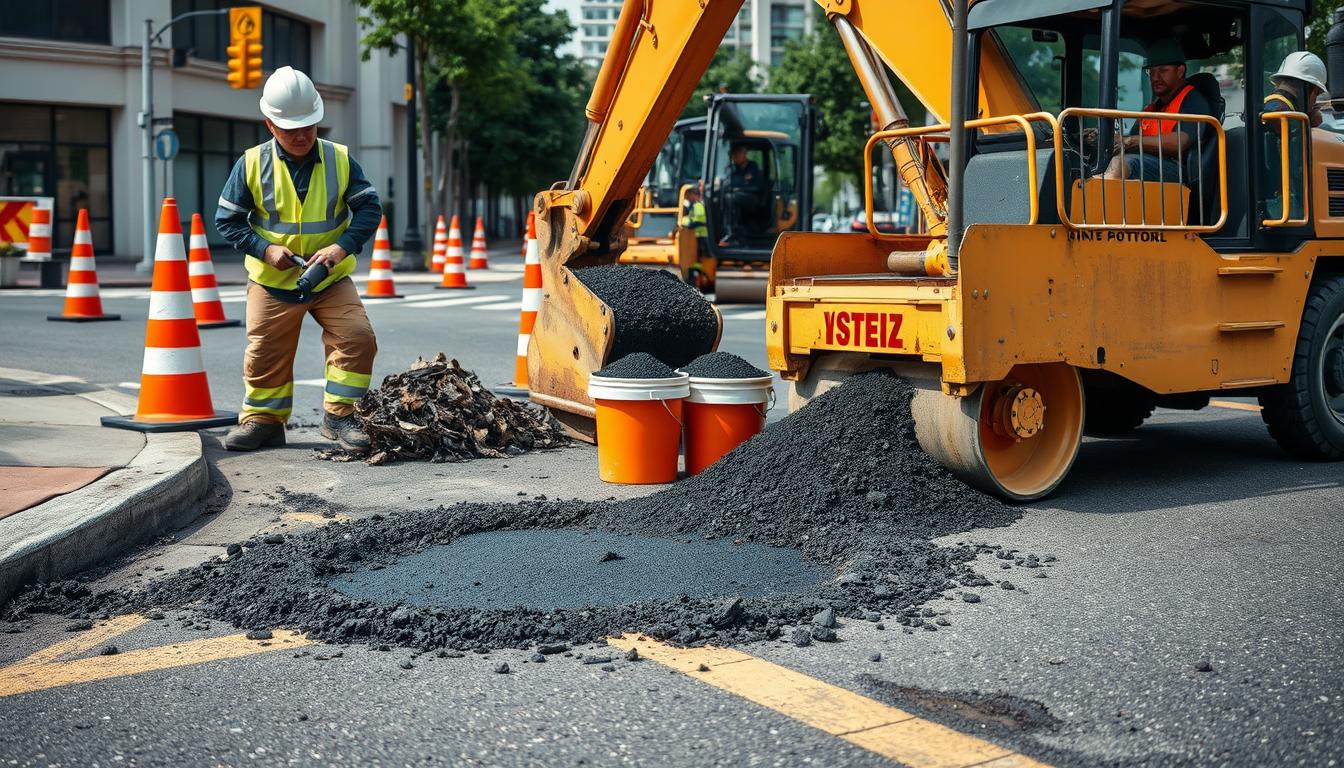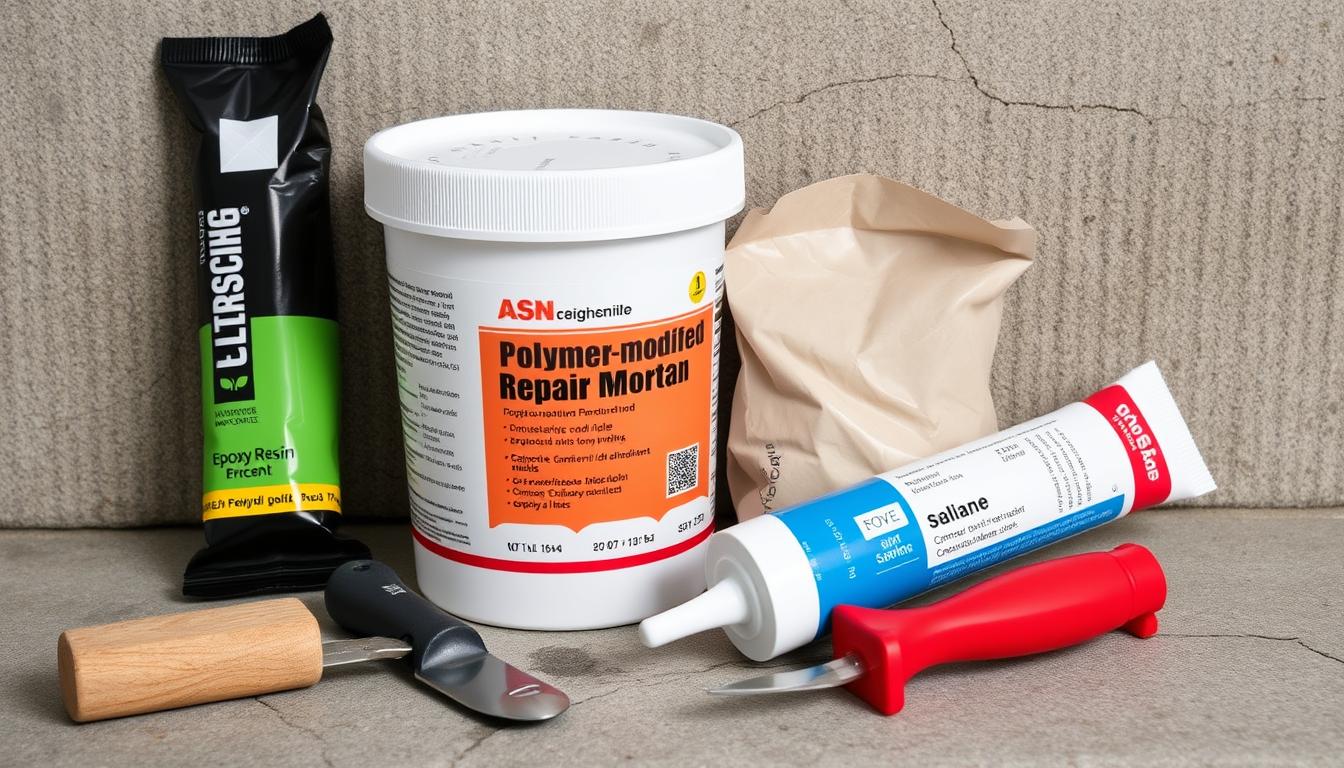Are you tired of seeing ugly cracks on your asphalt driveway? Want a fix that will last? You’ve come to the right place. We’ll explore the best asphalt crack-filling materials for you.
Asphalt driveways can crack due to poor installation, weak base, or cold weather. Fixing these cracks quickly is vital to prevent more damage. But you need the right filler for each type of crack to ensure a lasting repair.
Curious about the top materials for a lasting asphalt crack repair? Let’s dive in!
Key Takeaways:
- Repairing cracks in asphalt driveways is essential to prevent further damage and maintain a long-lasting surface.
- Not all crack fillers provide a lasting solution, and different types of cracks require different types of fillers.
- Hot mix asphalt (HMA) is ideal for sealing larger cracks up to 2 inches wide, providing a durable and seamless bond with the existing asphalt.
- Cold pour crack fillers are more convenient for smaller, less severe cracks and are often used in DIY projects.
- Regular crack filling is important for pavement maintenance, but it is not a permanent solution. It is recommended to have cracks filled every 3-5 years.
- Contact HT Paving for all your crack filling needs in San Mateo, CA, and surrounding areas.
Types of Asphalt Driveway Cracks
Asphalt driveways can have many types of cracks. Knowing the type is key to choosing the right fix. This ensures a lasting repair.
Fatigue Cracking
Fatigue cracking looks like a web of lines, often seen in heavy traffic areas. It’s called alligator cracking because it resembles an alligator’s skin. Fixing it quickly is important to prevent further damage.
Block Cracking
Block cracking forms squares or rectangles. It happens when the asphalt’s top layer shrinks. This is common in older driveways or those exposed to harsh weather. If not fixed, it can let water in, causing more harm.
Longitudinal Cracking
Longitudinal cracks are long and follow the traffic lines. They occur when the asphalt is laid poorly or lacks support. These cracks can let water in, leading to bigger problems. Fixing them might require more effort.
Transverse Cracking
Transverse cracks are short lines across the driveway. They appear when the asphalt shrinks in cold weather. These cracks let water in, adding to the damage. The length and depth depend on the cold weather.
Getting a professional to check your driveway’s cracks is wise. An asphalt contractor can recommend the best fix. They offer solutions tailored to your specific problem.
Types of Asphalt Crack Fillers
Choosing the right crack filler is essential for your asphalt driveway. We’ll look at two main types: hot rubberized and cold pour. Each has its own benefits.
Hot Rubberized Crack Filler
Hot rubberized crack fillers are top-quality and very tough. They need to be heated before application. This method is best for big cracks in busy areas or where the weather changes a lot. It makes the repair solid and ready for heavy use or harsh weather.
Cold Pour Driveway Crack Filler
For smaller, less serious cracks, cold pour driveway crack fillers are a good choice. They’re easy to use by simply pouring them out. They may not last as long as hot rubberized ones, but are great for simple repairs. They’re also budget-friendly, making them popular for home repairs.
Match the crack filler to the size and severity of the damage. Use hot rubberized for big cracks in busy places. For smaller cracks at home, cold pour is better.
Conclusion
Choosing the best asphalt crack filling material depends on durability, cost, and versatility. Hot rubberized crack fillers are great for lasting repairs. They withstand lots of use and harsh weather well. They’re best for fixing larger cracks because they last longer than other options.
But for smaller cracks and saving money, cold pour fillers are better. The Flex-A-Fill Hot Asphalt Crack Sealer is a good pick. It’s easy to use, perfect for DIY projects. It works on both asphalt and concrete, making it handy for many repair needs.
There’s also the Latex-ite Pli-Stix blacktop joint and crack sealer. It’s good for small repairs and is affordable. This product helps keep your asphalt driveway in good shape.
When picking a crack sealer, consider your project’s needs, the crack’s type, and your budget. Talking to a pro asphalt contractor can help you choose the right sealer. Look for one that’s durable, fits your budget, and works for different repair needs. This way, you can fix your asphalt driveway without breaking the bank.
Contact HT Paving for all your crack filling needs in San Mateo, CA, and surrounding areas.
FAQ
What are the best asphalt crack filling materials for a durable repair?
The best materials for fixing asphalt cracks are hot rubberized, cold pour, and professional-grade. Deery Hot Pour Rubberized Crack Sealer and Flex-A-Fill Hot Asphalt Crack Sealer are top choices.
What are the different types of asphalt driveway cracks?
Asphalt driveway cracks can appear as alligator scales, blocks, lines, or stripes. These are known as fatigue, block, longitudinal, and transverse cracking.
What are the main types of asphalt crack fillers?
The main types of fillers are hot rubberized and cold-pour. They help seal cracks to prevent further damage.
What are the advantages of hot rubberized crack fillers?
Hot rubberized fillers are very strong and durable. They’re best for large cracks and areas with heavy traffic or extreme cold.
What are the advantages of cold pour driveway crack fillers?
Cold pour fillers are simple to use for small cracks. They don’t need heating before application. They’re great for quick, simple repairs.
How do I choose the best crack sealer for my asphalt driveway repair?
Choosing the right sealer depends on your driveway’s needs, the cracks’ types, and your budget. It’s wise to consult an expert for the best advice.

